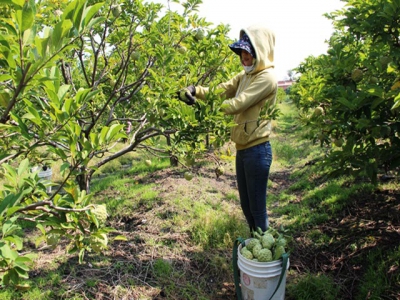Tây Ninh custard apple farmers embrace VietGAP standards

TÂY NINH – The southeastern province of Tây Ninh, the country’s largest custard apple producer, is growing the fruit to good agricultural practice (GAP) standards such as VietGAP and Global GAP to meet the market demand and improve farmers’ incomes.
Custard apples are grown to VietGAP standards in Tây Ninh City’s Thạnh Tân Commune. – VNA/VNS Photo Lê Đức Hoảnh
With its favourable natural conditions for growing the fruit, the province has around 5,000ha under custard apple and an annual output of more than 50,000 tonnes, mostly around Bà Đen Mountain in Tây Ninh City and Tân Châu and Dương Minh Châu districts.
In 2011 the National Office of Intellectual Property granted geographical indication (GI) certification for Bà Đen custard apple, helping improve the image of the province’s fruit at home and abroad.
To meet the market demand for high-quality custard apples in recent years the province Department of Agriculture and Rural Development assigned its agriculture extension centre to instruct farmers and companies to grow the fruit to VietGAP standards.
Most VietGAP-quality custard apples are sold to supermarkets or exported.
Huỳnh Biển Chiêu of Tây Ninh City’s Thạnh Tân Commune was the first farmer to achieve standards, and he received a certificate attesting this in 2012.
Chiêu now grows nearly 20ha of custard apple and harvests 400,000kg a year, selling them for VNĐ45,000 – 75,000 (US$2 - 3) a kilogramme in the local market.
They include three tonnes he sells to companies in HCM City for export to countries like the United Arab Emirates, Canada and China, he said.
The Natani Joint Stock Company in Tây Ninh City’s Tân Bình Commune grows more than 100ha of custard apples to VietGAP standards.
Nguyễn Thế Tân, its general director, said the company used mostly organic fertilisers and bio-products to grow the fruit.
The company sells nearly 100 tonnes of the fruit a month to supermarkets, and exports 15 – 20 tonnes to the US, Russia and Dubai.
Võ Đức Trong, director of the province’s Department of Agriculture and Rural Development, said the fruit offered higher incomes than many other crops.
If grown using proper techniques, farmers could earn VNĐ200 - 300 million ($8,620 – 12,930) per hectare per year, he said.
Farmers in the province use advanced techniques to stimulate fruiting during the off-season to ensure harvests year round.
The main harvest season though is in August-September.
Custard apples are susceptible to pests such as the mealybug and Mediterranean fruit fly, and so authorities have instructed farmers to cover the fruits with bags to protect them.
They have also organised training courses in preventing and controlling the two pests.
Có thể bạn quan tâm
 Vietnam Jan-Aug coffee exports likely fell 10.3% y/y: govt
Vietnam Jan-Aug coffee exports likely fell 10.3% y/y: govt Vietnam’s coffee exports in the first eight months of the year likely fell 10.3% from a year earlier to 1.19 million tonnes, while rice exports likely rose 0.1%
 Quality management and traceability to increase fruit exports
Quality management and traceability to increase fruit exports Vietnam’s fruit export value in 2018 reached nearly US$4 billion, with fruits sent to big markets like the US, Europe and Japan.
 Ho Chi Minh City steps up cooperation with Australia in high-tech agriculture
Ho Chi Minh City steps up cooperation with Australia in high-tech agriculture Ho Chi Minh City hopes to receive support and cooperation from Australia in developing high-tech agriculture, especially in processing farm produce.